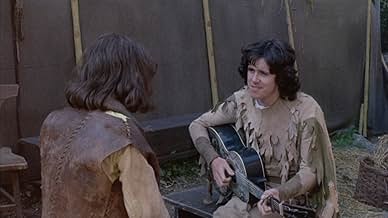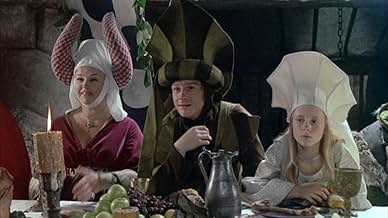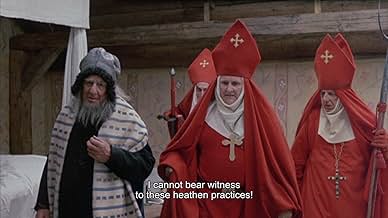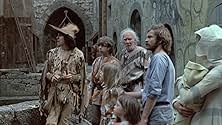NOTE IMDb
6,3/10
1 k
MA NOTE
En 1349, alors que la peste noire menace l'Allemagne, une troupe de saltimbanques arrive dans la ville de Hamelin qui se prépare au mariage de la fille du bourgmestre avec le fils du baron.En 1349, alors que la peste noire menace l'Allemagne, une troupe de saltimbanques arrive dans la ville de Hamelin qui se prépare au mariage de la fille du bourgmestre avec le fils du baron.En 1349, alors que la peste noire menace l'Allemagne, une troupe de saltimbanques arrive dans la ville de Hamelin qui se prépare au mariage de la fille du bourgmestre avec le fils du baron.
- Réalisation
- Scénario
- Casting principal
Avis à la une
Back when I was a (allegedly disturbed) young child, "The Pied Piper of Hamelin" was my absolute favorite fairy-tale. I owned many tapes that were filled with bedtime stories and fairy-tales, but I mostly just listened to "The Pied Piper" because it featured fascinatingly morbid topics like the black plague, child abduction, rat infestations and a mysteriously sinister guy playing the flute. I was always convinced the premise of Robert Browning's eerie poem could form the basis of a series of unimaginably dark horror movies, but unfortunately there aren't that many. This British production, filmed on location in Germany, is a pretty great version but it's incredibly obscure for some reason and I spent an awful long time purchasing a decent copy. Now that I finally own it, I'm both thrilled about re-experiencing the familiar story lines as well as surprised about discovering entirely new story aspects I wasn't even aware of. The new (to me, at least) elements mostly handle about political and religious hypocrisy, so I presume that is the reason why they weren't included in any of the fairy-tale versions I grew up with. But it remains a fascinating story and a fabulously engaging film, only suffering from obvious and regrettable budget restrictions. Director and co-writer Jacques Demy had a clear and personal vision of the story, and it's definitely not a movie for young children to watch. Although never graphic or repulsive, "The Pied Piper" thrives on a disturbing atmosphere and it never evades any controversial themes, like the abuse of political power by the Catholic Church and the arranged marriages with minors. Donovan is excellent as the Piper, passing through Hamelin with a family of traveling circus artists. The burgomaster and the Baron (another splendid role for versatile super-actor Donald Pleasance) supposedly run the secluded little town, but they mainly obey the will of the uncanny red monks that always look over their shoulders. The friendly Jewish alchemist Melius is concerned about a threatening outbreak of the Bubonic plague, the power-hungry son of the Baron (John Hurt) is about to wed the under-aged burgomaster's daughter for financial reasons and the Pied Piper is the only person capable of freeing the town from its rat infestation. The script of this film is well filled and requires your absolute full attention, but the elaboration of the different story lines is highly compelling and the dialogs are enchanting. The costume designs and scenery are terrific and genuinely take you back to the dark and unsettling medieval times. Donovan, primarily a singer, also provides the film with a couple of great songs (most notably "They Call me the Pied Piper" and "Life has its ups and downs") and there are at least two near-brilliant and unforgettable sequences. Namely the rats breaking out of the wedding cake and a harrowing execution scene near the end. If you own "The Pied Piper", it's definitely a film to treasure.
Watching this recently, I remembered certain scenes from when I watched it as a child of about 7 or 8, some twenty-five years ago. That is testament to how effective some of The Pied Piper is. Indeed, in some ways it hardly qualifies as a "childrens' film" at all, as it starts with a picture of a heretic being burned at the stake and ends with the death of one of the main characters by the same means. Clearly Demy had Bergman's The Seventh Seal in mind for the general feel of the film, which stresses the irrationality and brutality of the times. However, the screenwriters and Demy add another ingredient - the political chicanery of the Church, the aristocracy and the merchant class, sometimes colluding together, at other times each promoting their own special interests. It's not difficult to read the film as a quasi-Marxist parable about feudal society, and the film-makers clearly intended something of the sort. If that makes it all sound very heavy, actually the film is fairly fast-moving and fun, especially because of the wonderfully comic grotesque playing of Donald Pleasance and Roy Kinnear. Fans of these actors should definitely seek this film out - Pleasance is as good as he was in "Death Line" (AKA "Raw Meat") made about the same time, and Kinnear is nearly as good as he was in "Juggernaut", another overlooked but very interesting British film of the early 70s. There is also a very good performance from Michael Hordern as the rationalist alchemist, one of his better and most substantial but unfortunately least known performances. Nostalgia fans can also take pleasure in remembering a time when Jack Wild, made famous by "Oliver", was considered a star. The Pied Piper deserves its mixed critical reputation. Demy does not here have the firm control over his material he had in earlier films. The main flaw is the total lack of characterisation of the Piper, and the terrible non-acting of the folk singer Donovan in that role. His musical interludes are just embarrassing and the worst thing about the film (for a similar ruining of a otherwise thoughtful historical film by a miscast singing star, see 1969's "Where's Jack?" with Tommy Steele). This is a pity as the socio-political stuff at the edges of the film, plus the costumes and scenery, are very good indeed. Overall, this is certainly worth a watch if it turns up on TV or you might, as I did, seek it out on a secondhand VHS cassette. It is not a major film but it's an endearing oddity, and certainly a must-see for Demy students or fans of Brtish film in the early 70s.
The original 303-line poem "The Pied Piper of Hamelin" was published by Robert Browning in 1842, and wow it's a doozy--thoroughly disturbing to the core and meant to be so. How we ended up with a cute bedtime fable is beyond me, but then again, in the original Sleeping Beauty, the Prince rapes her in her sleep. So.
Here in 1972, we get an excellent adaptation of the tale which retains much of the poem's disturbing nature but with a slightly softened tone, offering glimmers of goodness and hope despite the backdrop of 13th Century inhumanity, greed, religious murders and child marriages. Yea, did I mention this is not for kids?
What offsets the disturbing story is largely the wonderful performance and gentle voice of Donovan who plays the titular Piper. Whereas in the original poem the piper was sort of a mysterious opportunistic rogue, here we get a mysterious character who is more of a wise, savior figure. The songs he sings (written by Donovan) are not just beautiful to the ear, but the lyrics are tranquil and reassuring.
This contrasts brilliantly against the disturbing story which is about a small German village that is besieged not only by the plague but, even worse, besieged by a consortium of corrupt politicians, priests and landowners who would tax their own grandmother's false teeth. It gets even more disturbing as the plot revolves around a baron's shifty son who is preparing to wed an 11-year-old-girl so he can collect the dowry and fund his violent exploits, and all the while his father the baron is squeezing blood out of the villagers so he can build a cathedral in his own honor--much to the drooling approval of the local bishops. This is heavy stuff. This is not a children's fable. But it's a brilliantly done film.
Not only are the acting performances riveting, from Donald Pleasance as the tyrannical baron to John Hurt as his loathsome son to Michael Hordern as Melius the scholar who is the sole voice of reason, but the camera style is thoroughly engaging as it follows the action gracefully for long stretches without a cut. If you watch this film, notice how the camera moves through the scenery almost like a silent character in the film, and this draws us tighter into the drama in a voyeuristic way. The sets are enormous and authentic, and as I mentioned the music is first rate.
On a subtle note, the film also attempts to nudge history back toward the truth. In the original poem, as well as for centuries, it was commonly accepted and taught that rats were the cause of the Black Plague, but only in recent years have we learned that the plague was spread by people basically drinking water out of their own sewers (go figure). And in this adaptation, the rats are not shown to be the vile "vermin" which Robert Browning accused them of being, but instead they are shown to be more like symbolic warnings of what will befall man if man doesn't clean up his act.
There's a beautiful, sobering moment where the piper talks to a rat and says something like "I know you must treat each other much better than men treat each other" and that short scene summarizes the spirit of this film. Yes, it's disturbing, yes it shows the atrocities and cruelty that humans inflict upon each other, but there's a subtle undercurrent that tells us wisdom will eventually prevail. Will it? I dunno, nearly 50 years after the film's release we're still waiting.
Here in 1972, we get an excellent adaptation of the tale which retains much of the poem's disturbing nature but with a slightly softened tone, offering glimmers of goodness and hope despite the backdrop of 13th Century inhumanity, greed, religious murders and child marriages. Yea, did I mention this is not for kids?
What offsets the disturbing story is largely the wonderful performance and gentle voice of Donovan who plays the titular Piper. Whereas in the original poem the piper was sort of a mysterious opportunistic rogue, here we get a mysterious character who is more of a wise, savior figure. The songs he sings (written by Donovan) are not just beautiful to the ear, but the lyrics are tranquil and reassuring.
This contrasts brilliantly against the disturbing story which is about a small German village that is besieged not only by the plague but, even worse, besieged by a consortium of corrupt politicians, priests and landowners who would tax their own grandmother's false teeth. It gets even more disturbing as the plot revolves around a baron's shifty son who is preparing to wed an 11-year-old-girl so he can collect the dowry and fund his violent exploits, and all the while his father the baron is squeezing blood out of the villagers so he can build a cathedral in his own honor--much to the drooling approval of the local bishops. This is heavy stuff. This is not a children's fable. But it's a brilliantly done film.
Not only are the acting performances riveting, from Donald Pleasance as the tyrannical baron to John Hurt as his loathsome son to Michael Hordern as Melius the scholar who is the sole voice of reason, but the camera style is thoroughly engaging as it follows the action gracefully for long stretches without a cut. If you watch this film, notice how the camera moves through the scenery almost like a silent character in the film, and this draws us tighter into the drama in a voyeuristic way. The sets are enormous and authentic, and as I mentioned the music is first rate.
On a subtle note, the film also attempts to nudge history back toward the truth. In the original poem, as well as for centuries, it was commonly accepted and taught that rats were the cause of the Black Plague, but only in recent years have we learned that the plague was spread by people basically drinking water out of their own sewers (go figure). And in this adaptation, the rats are not shown to be the vile "vermin" which Robert Browning accused them of being, but instead they are shown to be more like symbolic warnings of what will befall man if man doesn't clean up his act.
There's a beautiful, sobering moment where the piper talks to a rat and says something like "I know you must treat each other much better than men treat each other" and that short scene summarizes the spirit of this film. Yes, it's disturbing, yes it shows the atrocities and cruelty that humans inflict upon each other, but there's a subtle undercurrent that tells us wisdom will eventually prevail. Will it? I dunno, nearly 50 years after the film's release we're still waiting.
I had seen this one ages ago on local TV, back in the early 1980s when our set was still in black-and-white! Naturally, I welcomed Paramount’s idea to let Legend Films release it on DVD albeit bare-bones, and I luckily happened upon it in (arguably) Malta’s best-stocked DVD rental store when it comes to vintage Hollywood movies.
I’ve been a fan of Fairy Tales every since early childhood when illustrated Maltese translations of the Brothers Grimm’s famous stories where constant companions during the Summer holidays and, when my main interest migrated to film, I eagerly sought out examples of this type. The French seemed to do the genre particularly well – Ladislaw Starewicz’s delightful pioneering puppet classic THE TALE OF THE FOX (1931), Jean Cocteau’s enchanting LA BELLE ET LA BETE (1946) and the charming animated fable LE ROI ET L’OISEAU (1979). Jacques Demy also tried his hand at this by bringing DONKEY SKIN (1970) to the screen with Catherine Deneuve, Jacques Perrin, Jean Marais and Delphine Seyrig. In fact, THE PIED PIPER was his next project and follows similar lines – even if it’s a British production shot in Germany, though still with an equally remarkable cast: Jack Wild, Donald Pleasence, John Hurt, Michael Hordern, Peter Vaughan, Roy Kinnear, Diana Dors and, in the titular role, folk singer Donovan! The general consensus about Demy is that his career peaked early (late 1960s) and progressed engagingly but unremarkably towards an untimely end (early 1990s); actually, I haven’t seen any of his acknowledged masterpieces yet – I do own THE UMBRELLAS OF CHERBOURG (1964) on R2 DVD, though, and also have the ultra-rare LADY Oscar (1979) in my unwatched pile.
While Maltin gives this version of THE PIED PIPER (incidentally, the 1957 TV-film with Van Johnson and Claude Rains is also available for rental over here) a very generous , most other reviews of the film I’ve come across were usually mixed and less enthusiastic. In fact, I’d say that its unexpectedly grim tone got to be a bit much at times and left one with a sour taste in the mouth; besides, in spite of Demy’s detached approach (with very few close-ups throughout), the whole still felt somewhat claustrophobic. Even so, the actors, the décor, the costumes and the music eventually save the day: Wild has probably his most significant role after OLIVER! (1968) as Jewish alchemist Hordern’s lame assistant; Pleasence and Hurt are truly despicable as greedy father and son and the town’s chief citizens; Kinnear and Dors as the burgomaster and his wife who want to marry off their teenage offspring (Cathy Harrison, Rex’s daughter) to Hurt; Peter Vaughan is a bloodthirsty Bishop who eventually has Hordern burned alive at the stake.
The troupe of traveling players in a plague-ridden medieval town cannot help but raise comparisons with Ingmar Bergman’s THE SEVENTH SEAL (1957), while the onslaught of the rats (at one point coming out of the wedding cake!) might well have influenced a similar scene in Werner Herzog’s NOSFERATU THE VAMPYRE (1979). Finally, Donavan’s score is pleasant if not quite memorable – his performance is equally decent even if, the film’s title notwithstanding, he is not really the main character!
I’ve been a fan of Fairy Tales every since early childhood when illustrated Maltese translations of the Brothers Grimm’s famous stories where constant companions during the Summer holidays and, when my main interest migrated to film, I eagerly sought out examples of this type. The French seemed to do the genre particularly well – Ladislaw Starewicz’s delightful pioneering puppet classic THE TALE OF THE FOX (1931), Jean Cocteau’s enchanting LA BELLE ET LA BETE (1946) and the charming animated fable LE ROI ET L’OISEAU (1979). Jacques Demy also tried his hand at this by bringing DONKEY SKIN (1970) to the screen with Catherine Deneuve, Jacques Perrin, Jean Marais and Delphine Seyrig. In fact, THE PIED PIPER was his next project and follows similar lines – even if it’s a British production shot in Germany, though still with an equally remarkable cast: Jack Wild, Donald Pleasence, John Hurt, Michael Hordern, Peter Vaughan, Roy Kinnear, Diana Dors and, in the titular role, folk singer Donovan! The general consensus about Demy is that his career peaked early (late 1960s) and progressed engagingly but unremarkably towards an untimely end (early 1990s); actually, I haven’t seen any of his acknowledged masterpieces yet – I do own THE UMBRELLAS OF CHERBOURG (1964) on R2 DVD, though, and also have the ultra-rare LADY Oscar (1979) in my unwatched pile.
While Maltin gives this version of THE PIED PIPER (incidentally, the 1957 TV-film with Van Johnson and Claude Rains is also available for rental over here) a very generous , most other reviews of the film I’ve come across were usually mixed and less enthusiastic. In fact, I’d say that its unexpectedly grim tone got to be a bit much at times and left one with a sour taste in the mouth; besides, in spite of Demy’s detached approach (with very few close-ups throughout), the whole still felt somewhat claustrophobic. Even so, the actors, the décor, the costumes and the music eventually save the day: Wild has probably his most significant role after OLIVER! (1968) as Jewish alchemist Hordern’s lame assistant; Pleasence and Hurt are truly despicable as greedy father and son and the town’s chief citizens; Kinnear and Dors as the burgomaster and his wife who want to marry off their teenage offspring (Cathy Harrison, Rex’s daughter) to Hurt; Peter Vaughan is a bloodthirsty Bishop who eventually has Hordern burned alive at the stake.
The troupe of traveling players in a plague-ridden medieval town cannot help but raise comparisons with Ingmar Bergman’s THE SEVENTH SEAL (1957), while the onslaught of the rats (at one point coming out of the wedding cake!) might well have influenced a similar scene in Werner Herzog’s NOSFERATU THE VAMPYRE (1979). Finally, Donavan’s score is pleasant if not quite memorable – his performance is equally decent even if, the film’s title notwithstanding, he is not really the main character!
The bubonic plague often began with the death of the rats before it spread to the people. This movie's version of the pied piper seems far closer to the origin of the story than anything else I've seen.
Le saviez-vous
- AnecdotesThe film was considered too dark for a children's film.
- ConnexionsFeatured in Jacquot de Nantes (1991)
Meilleurs choix
Connectez-vous pour évaluer et suivre la liste de favoris afin de recevoir des recommandations personnalisées
- How long is The Pied Piper?Alimenté par Alexa
Détails
- Date de sortie
- Pays d’origine
- Site officiel
- Langues
- Aussi connu sous le nom de
- The Pied Piper
- Lieux de tournage
- Sociétés de production
- Voir plus de crédits d'entreprise sur IMDbPro
Contribuer à cette page
Suggérer une modification ou ajouter du contenu manquant

Lacune principale
By what name was Le joueur de flûte (1972) officially released in India in English?
Répondre




























